What does a researcher do?
Would you make a good researcher? Take our career test and find your match with over 800 careers.

What is a Researcher?
A researcher is trained to conduct systematic and scientific investigations in a particular field of study. Researchers use a variety of techniques to collect and analyze data to answer research questions or test hypotheses. They are responsible for designing studies, collecting data, analyzing data, and interpreting the results. Researchers may work in a wide range of fields, including science, medicine, engineering, social sciences, humanities, and many others.
To become a researcher, individuals usually need to obtain a graduate degree in their chosen field of study. They may also need to gain experience working as an assistant or intern in a research setting before becoming a full-fledged researcher. Researchers may work in academic or industrial settings, or they may work independently as consultants or freelance researchers. Regardless of the setting, researchers play a vital role in advancing knowledge and finding solutions to real-world problems.
What does a Researcher do?

Researchers are essential to the advancement of knowledge in various fields, including science, technology, medicine, social sciences, and humanities. Their work involves conducting systematic investigations to gather data, analyze it, and draw meaningful conclusions. Through their research, they can identify new problems and challenges, develop innovative solutions, and test hypotheses to validate theories.
Researchers also play a critical role in improving existing practices and policies, identifying gaps in knowledge, and creating new avenues for future research. They provide valuable insights and information that can inform decision-making, shape public opinion, and drive progress in society.
Duties and Responsibilities The duties and responsibilities of researchers can vary depending on the field of study and the type of research being conducted. However, here are some common duties and responsibilities that researchers are typically expected to fulfill:
- Develop research proposals: Developing a research proposal typically involves identifying a research question or problem, reviewing the relevant literature, selecting appropriate research methods and techniques, and outlining the expected outcomes of the research. Researchers must also ensure that their proposal aligns with the funding agency's objectives and guidelines.
- Conduct literature reviews: Literature reviews involve searching for and reviewing existing research papers, articles, books, and other relevant publications to identify gaps in knowledge and to build upon previous research. Researchers must ensure that they are using credible and reliable sources of information and that their review is comprehensive.
- Collect and analyze data: Collecting and analyzing data is a key aspect of research. This may involve designing and conducting experiments, surveys, interviews, or observations. Researchers must ensure that their data collection methods are valid and reliable, and that their analysis is appropriate and accurate.
- Ensure ethical considerations: Research ethics involve ensuring that the research is conducted in a manner that protects the rights, welfare, and dignity of all participants, as well as the environment. Researchers must obtain informed consent from human participants, ensure that animal research is conducted ethically and humanely, and comply with relevant regulations and guidelines.
- Communicate research findings: Researchers must communicate their research findings clearly and effectively to a range of audiences, including academic peers, policymakers, and the general public. This may involve writing research papers, presenting at conferences, and producing reports or other materials.
- Manage research projects: Managing a research project involves planning, organizing, and coordinating resources, timelines, and budgets to ensure that the project is completed on time and within budget. Researchers must ensure that they have the necessary resources, such as funding, personnel, and equipment, and that they are managing these resources effectively.
- Collaborate with others: Collaboration is an important aspect of research, and researchers often work with other researchers, academic institutions, funding agencies, and industry partners to achieve research objectives. Collaboration can help to facilitate the sharing of resources, expertise, and knowledge.
- Stay up-to-date with developments in their field: Research is an evolving field, and researchers must stay up-to-date with the latest developments and trends in their field to ensure that their research remains relevant and impactful. This may involve attending conferences, workshops, and seminars, reading academic journals and other publications, and participating in professional development opportunities.
Types of Researchers There are many types of researchers, depending on their areas of expertise, research methods, and the types of questions they seek to answer. Here are some examples:
- Basic Researchers: These researchers focus on understanding fundamental concepts and phenomena in a particular field. Their work may not have immediate practical applications, but it lays the groundwork for applied research.
- Applied Researchers: These researchers seek to apply basic research findings to real-world problems and situations. They may work in fields such as engineering, medicine, or psychology.
- Clinical Researchers: These researchers conduct studies with human subjects to better understand disease, illness, and treatment options. They may work in hospitals, universities, or research institutes.
- Epidemiologists : These researchers study the spread and distribution of disease in populations, and work to develop strategies for disease prevention and control.
- Social Scientists: These researchers study human behavior and society, using methods such as surveys, experiments, and observations. They may work in fields such as psychology, sociology, or anthropology.
- Natural Scientists: These researchers study the natural world, including the physical, chemical, and biological processes that govern it. They may work in fields such as physics, chemistry, or biology.
- Data Scientists : These researchers use statistical and computational methods to analyze large datasets and derive insights from them. They may work in fields such as machine learning, artificial intelligence, or business analytics.
- Policy Researchers: These researchers study policy issues, such as healthcare, education, or environmental regulations, and work to develop evidence-based policy recommendations. They may work in government agencies, think tanks, or non-profit organizations.
What is the workplace of a Researcher like?
The workplace of a researcher can vary greatly depending on the field and area of study. Researchers can work in a variety of settings, including academic institutions, government agencies, non-profit organizations, and private companies.
In academic settings, researchers often work in universities or research institutions, conducting experiments and analyzing data to develop new theories and insights into various fields of study. They may also teach courses and mentor students in their area of expertise.
In government agencies, researchers may work on projects related to public policy, health, and safety. They may be responsible for conducting research to support the development of new regulations or programs, analyzing data to assess the effectiveness of existing policies, or providing expertise on specific issues.
Non-profit organizations often employ researchers to study social and environmental issues, such as poverty, climate change, and human rights. These researchers may conduct surveys and collect data to understand the impact of various programs and initiatives, and use this information to advocate for policy changes or other interventions.
Private companies also employ researchers, particularly in industries such as technology and healthcare. These researchers may be responsible for developing new products, improving existing technologies, or conducting market research to understand consumer preferences and behaviors.
Regardless of the setting, researchers typically spend a significant amount of time conducting research, analyzing data, and communicating their findings through presentations, reports, and publications. They may also collaborate with other researchers or professionals in their field, attend conferences and workshops, and stay up-to-date with the latest research and developments in their area of expertise.
Frequently Asked Questions
Academic writer vs researcher.
An academic writer is someone who produces written material for academic purposes, such as research papers, essays, and other scholarly works. Academic writers may work as freelance writers, editors, or as staff writers for academic institutions or publishers.
On the other hand, a researcher is someone who conducts original research to generate new knowledge or validate existing knowledge. Researchers may work in academic settings, government agencies, private companies, or non-profit organizations. They typically design and execute experiments, surveys, or other data collection methods, analyze the data, and draw conclusions based on their findings.
While there may be some overlap between the skills required for academic writing and research, they are distinct activities with different goals. Academic writers often rely on the research of others to support their arguments, while researchers generate new knowledge through their own experiments and data analysis. However, academic writers may also be researchers who write about their own research findings.
Continue reading
Purdue Online Writing Lab Purdue OWL® College of Liberal Arts
Research: Where to Begin

Welcome to the Purdue OWL
This page is brought to you by the OWL at Purdue University. When printing this page, you must include the entire legal notice.
Copyright ©1995-2018 by The Writing Lab & The OWL at Purdue and Purdue University. All rights reserved. This material may not be published, reproduced, broadcast, rewritten, or redistributed without permission. Use of this site constitutes acceptance of our terms and conditions of fair use.
Research isn't something that only scientists and professors do. Any time you use sources to investigate claims or reach new conclusions, you are performing research. Research happens in virtually all fields, so it’s vitally important to know how to conduct research and navigate through source material regardless of your professional or academic role.
Choosing and Narrowing Your Research Topic
Before beginning the process of looking for sources, it’s important to choose a research topic that is specific enough to explore in-depth. If your focus is too broad, it will be difficult to find sources that back up what you’re trying to say.
If your instructor gives you the flexibility to choose your own research topic, you might begin by brainstorming a list of topics that interest you ( click here to visit an OWL page that can help you get started brainstorming or prewriting ). Once you find something that grabs your attention, the next step is to narrow your topic to a manageable scope. Some ways to narrow your focus are by sub-topic, demographic, or time period.
For example, suppose that you want to research cancer treatments. Cancer treatment is a fairly broad topic, so you would be wise to at least consider narrowing your scope. For example, you could focus on a sub-topic of cancer treatment, such as chemotherapy or radiation therapy. However, these are still broad topics, so you might also narrow your topic to a narrower sub-topic or even examine how these topics relate to a specific demographic or time period. In the end, you might decide to research how radiation therapy for women over fifty has changed in the past twenty years. In sum, having a specific idea of what you want to research helps you find a topic that feels more manageable.
Writing Your Research Question
Writing your research topic as a question helps you focus your topic in a clear and concise way. It ensure that your topic is arguable. While not all research papers have to offer an explicit argument, many do.
For the above example, you might phrase your research question like this: "How has radiation therapy changed in the past twenty years for women over fifty?" Of course, phrasing this topic as a question assumes that the research has, in fact, changed. Reading your sources (or, to begin with, at least summaries and abstracts of those sources) will help you formulate a research question that makes sense.
Knowing What Types of Sources You Need
Depending on the type of research you’re doing, you may need to use different types of sources. Research is usually divided into scholarly and popular, and primary and secondary. For more information on specific details about these types of sources, visit our "Where to Begin" page in our "Evaluating Sources" subsection. This subsection contains additional pages that explore various kinds of sources (like, e.g., internet sources) in more detail.
Asking Productive Questions
Before you begin your research, you should ask yourself questions that help narrow your search parameters.
What kind of information are you looking for?
Different types of research will require different sources. It’s important to know what kinds of sources your research demands. Ask whether you need facts or opinions, news reports, research studies, statistics and data, personal reflections, archival research, etc. Restricting yourself to only the most relevant kinds of sources will make the research process seem less daunting.
Where do you need to look for your research?
Your research topic will also dictate where you find your sources. This extends beyond simply whether you use the internet or a print source. For example, if you are searching for information on a current event, a well-regarded newspaper like the New York Times or Wall Street Journal could be a useful source. If you are searching for statistics on some aspect of the U.S. population, then you might want to start with government documents, such as census reports. While much high-level academic research relies mainly on the sorts of academic journal articles and scholarly books that can be found in university libraries, depending the nature of your research project, you may need to look elsewhere.
How much information do you need?
Different research projects require different numbers of sources. For example, if you need to address both sides of a controversial issue, you may need to find more sources than if you were pursuing a non-controversial topic. Be sure to speak with your instructor if you are unclear on how many sources you will be expected to use.
How timely does your research need to be?
Depending on your research topic, the timeliness of your source may or may not matter. For example, if you are looking into recent changes in a specific scientific field, you would want the most up-to-date research. However, if you were researching the War of 1812, you might benefit from finding primary sources written during that time period.

* Research Basics *
- Introduction
So What Do We Mean By “Formal Research?”
- Guide License
- Types of Research
- Secondary Research | Literature Review
- Developing Your Topic
- Using and Evaluating Sources
- Ethics & Responsible Conduct of Research
- More Information

Paul V. Galvin Library

email: [email protected]
Chat with us:
Make a research appointment:, search our faq:.
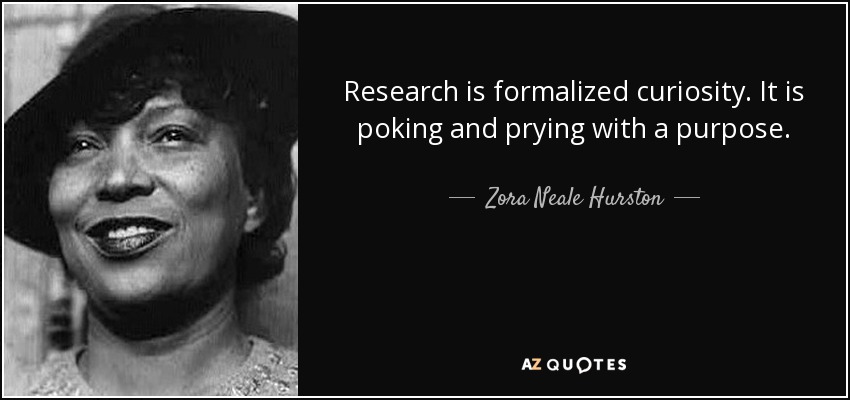
A good working definition of research might be:
Research is the deliberate, purposeful, and systematic gathering of data, information, facts, and/or opinions for the advancement of personal, societal, or overall human knowledge.
Based on this definition, we all do research all the time. Most of this research is casual research. Asking friends what they think of different restaurants, looking up reviews of various products online, learning more about celebrities; these are all research.
Formal research includes the type of research most people think of when they hear the term “research”: scientists in white coats working in a fully equipped laboratory. But formal research is a much broader category that just this. Most people will never do laboratory research after graduating from college, but almost everybody will have to do some sort of formal research at some point in their careers.
Casual research is inward facing: it’s done to satisfy our own curiosity or meet our own needs, whether that’s choosing a reliable car or figuring out what to watch on TV. Formal research is outward facing. While it may satisfy our own curiosity, it’s primarily intended to be shared in order to achieve some purpose. That purpose could be anything: finding a cure for cancer, securing funding for a new business, improving some process at your workplace, proving the latest theory in quantum physics, or even just getting a good grade in your Humanities 200 class.
What sets formal research apart from casual research is the documentation of where you gathered your information from. This is done in the form of “citations” and “bibliographies.” Citing sources is covered in the section "Citing Your Sources."
Formal research also follows certain common patterns depending on what the research is trying to show or prove. These are covered in the section “Types of Research.”
- Next: TL;DR >>
- Last Updated: Jul 24, 2024 4:33 PM
- URL: https://guides.library.iit.edu/research_basics
- Skip to main content
- Skip to primary sidebar
- Skip to footer
- QuestionPro

- Solutions Industries Gaming Automotive Sports and events Education Government Travel & Hospitality Financial Services Healthcare Cannabis Technology Use Case AskWhy Communities Audience Contactless surveys Mobile LivePolls Member Experience GDPR Positive People Science 360 Feedback Surveys
- Resources Blog eBooks Survey Templates Case Studies Training Help center
Home Market Research
What is Research: Definition, Methods, Types & Examples
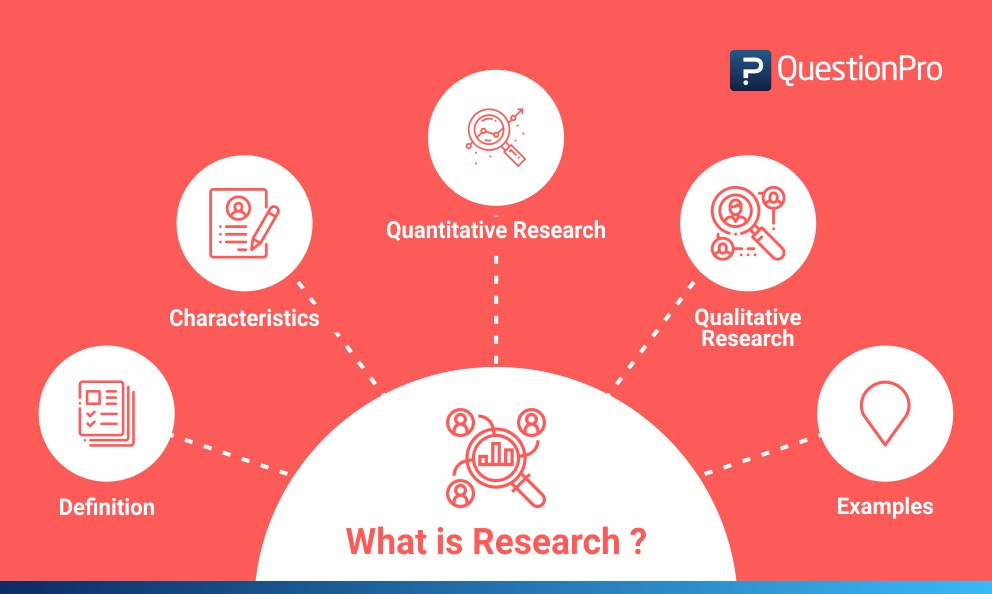
The search for knowledge is closely linked to the object of study; that is, to the reconstruction of the facts that will provide an explanation to an observed event and that at first sight can be considered as a problem. It is very human to seek answers and satisfy our curiosity. Let’s talk about research.
Content Index
What is Research?
What are the characteristics of research.
- Comparative analysis chart
Qualitative methods
Quantitative methods, 8 tips for conducting accurate research.
Research is the careful consideration of study regarding a particular concern or research problem using scientific methods. According to the American sociologist Earl Robert Babbie, “research is a systematic inquiry to describe, explain, predict, and control the observed phenomenon. It involves inductive and deductive methods.”
Inductive methods analyze an observed event, while deductive methods verify the observed event. Inductive approaches are associated with qualitative research , and deductive methods are more commonly associated with quantitative analysis .
Research is conducted with a purpose to:
- Identify potential and new customers
- Understand existing customers
- Set pragmatic goals
- Develop productive market strategies
- Address business challenges
- Put together a business expansion plan
- Identify new business opportunities
- Good research follows a systematic approach to capture accurate data. Researchers need to practice ethics and a code of conduct while making observations or drawing conclusions.
- The analysis is based on logical reasoning and involves both inductive and deductive methods.
- Real-time data and knowledge is derived from actual observations in natural settings.
- There is an in-depth analysis of all data collected so that there are no anomalies associated with it.
- It creates a path for generating new questions. Existing data helps create more research opportunities.
- It is analytical and uses all the available data so that there is no ambiguity in inference.
- Accuracy is one of the most critical aspects of research. The information must be accurate and correct. For example, laboratories provide a controlled environment to collect data. Accuracy is measured in the instruments used, the calibrations of instruments or tools, and the experiment’s final result.
What is the purpose of research?
There are three main purposes:
- Exploratory: As the name suggests, researchers conduct exploratory studies to explore a group of questions. The answers and analytics may not offer a conclusion to the perceived problem. It is undertaken to handle new problem areas that haven’t been explored before. This exploratory data analysis process lays the foundation for more conclusive data collection and analysis.
LEARN ABOUT: Descriptive Analysis
- Descriptive: It focuses on expanding knowledge on current issues through a process of data collection. Descriptive research describe the behavior of a sample population. Only one variable is required to conduct the study. The three primary purposes of descriptive studies are describing, explaining, and validating the findings. For example, a study conducted to know if top-level management leaders in the 21st century possess the moral right to receive a considerable sum of money from the company profit.
LEARN ABOUT: Best Data Collection Tools
- Explanatory: Causal research or explanatory research is conducted to understand the impact of specific changes in existing standard procedures. Running experiments is the most popular form. For example, a study that is conducted to understand the effect of rebranding on customer loyalty.
Here is a comparative analysis chart for a better understanding:
It begins by asking the right questions and choosing an appropriate method to investigate the problem. After collecting answers to your questions, you can analyze the findings or observations to draw reasonable conclusions.
When it comes to customers and market studies, the more thorough your questions, the better the analysis. You get essential insights into brand perception and product needs by thoroughly collecting customer data through surveys and questionnaires . You can use this data to make smart decisions about your marketing strategies to position your business effectively.
To make sense of your study and get insights faster, it helps to use a research repository as a single source of truth in your organization and manage your research data in one centralized data repository .
Types of research methods and Examples
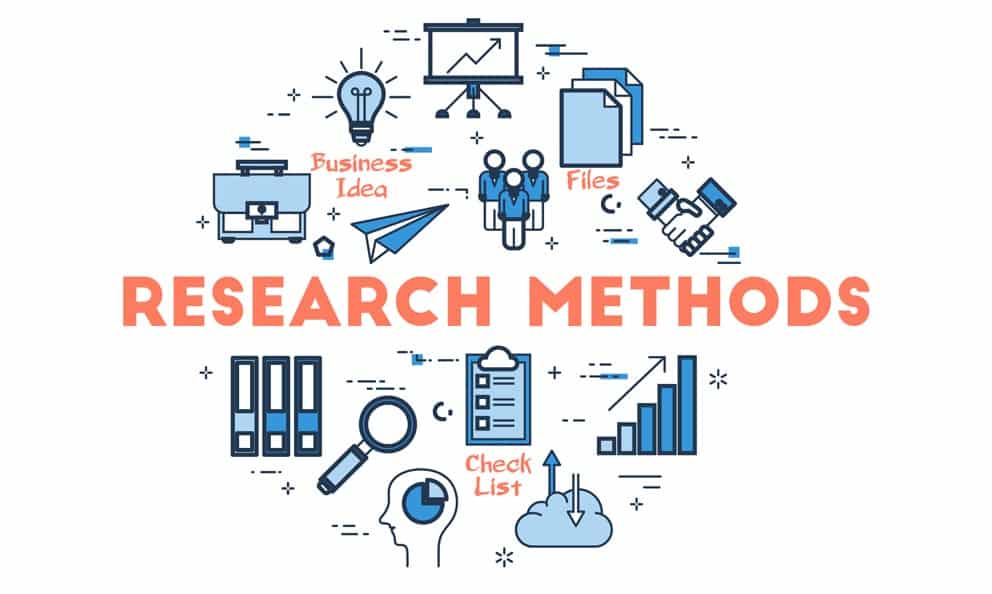
Research methods are broadly classified as Qualitative and Quantitative .
Both methods have distinctive properties and data collection methods .
Qualitative research is a method that collects data using conversational methods, usually open-ended questions . The responses collected are essentially non-numerical. This method helps a researcher understand what participants think and why they think in a particular way.
Types of qualitative methods include:
- One-to-one Interview
- Focus Groups
- Ethnographic studies
- Text Analysis
Quantitative methods deal with numbers and measurable forms . It uses a systematic way of investigating events or data. It answers questions to justify relationships with measurable variables to either explain, predict, or control a phenomenon.
Types of quantitative methods include:
- Survey research
- Descriptive research
- Correlational research
LEARN MORE: Descriptive Research vs Correlational Research
Remember, it is only valuable and useful when it is valid, accurate, and reliable. Incorrect results can lead to customer churn and a decrease in sales.
It is essential to ensure that your data is:
- Valid – founded, logical, rigorous, and impartial.
- Accurate – free of errors and including required details.
- Reliable – other people who investigate in the same way can produce similar results.
- Timely – current and collected within an appropriate time frame.
- Complete – includes all the data you need to support your business decisions.
Gather insights
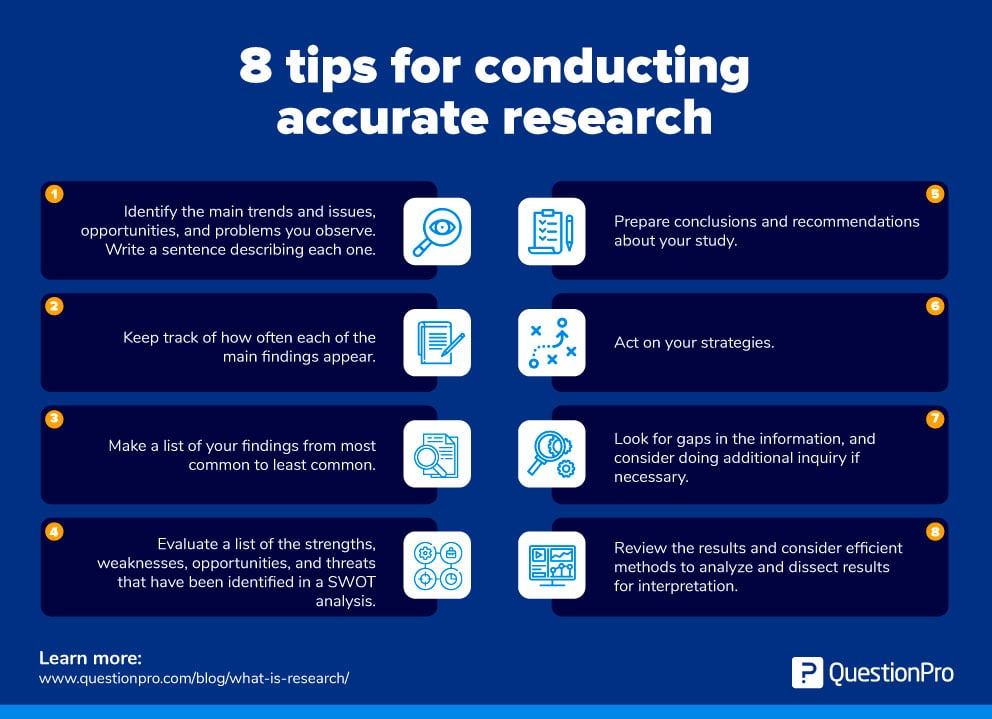
- Identify the main trends and issues, opportunities, and problems you observe. Write a sentence describing each one.
- Keep track of the frequency with which each of the main findings appears.
- Make a list of your findings from the most common to the least common.
- Evaluate a list of the strengths, weaknesses, opportunities, and threats identified in a SWOT analysis .
- Prepare conclusions and recommendations about your study.
- Act on your strategies
- Look for gaps in the information, and consider doing additional inquiry if necessary
- Plan to review the results and consider efficient methods to analyze and interpret results.
Review your goals before making any conclusions about your study. Remember how the process you have completed and the data you have gathered help answer your questions. Ask yourself if what your analysis revealed facilitates the identification of your conclusions and recommendations.
LEARN MORE ABOUT OUR SOFTWARE FREE TRIAL
MORE LIKE THIS

Maximize Employee Feedback with QuestionPro Workforce’s Slack Integration
Nov 6, 2024

2024 Presidential Election Polls: Harris vs. Trump
Nov 5, 2024

Your First Question Should Be Anything But, “Is The Car Okay?” — Tuesday CX Thoughts

QuestionPro vs. Qualtrics: Who Offers the Best 360-Degree Feedback Platform for Your Needs?
Nov 4, 2024
Other categories
- Academic Research
- Artificial Intelligence
- Assessments
- Brand Awareness
- Case Studies
- Communities
- Consumer Insights
- Customer effort score
- Customer Engagement
- Customer Experience
- Customer Loyalty
- Customer Research
- Customer Satisfaction
- Employee Benefits
- Employee Engagement
- Employee Retention
- Friday Five
- General Data Protection Regulation
- Insights Hub
- Life@QuestionPro
- Market Research
- Mobile diaries
- Mobile Surveys
- New Features
- Online Communities
- Question Types
- Questionnaire
- QuestionPro Products
- Release Notes
- Research Tools and Apps
- Revenue at Risk
- Survey Templates
- Training Tips
- Tuesday CX Thoughts (TCXT)
- Uncategorized
- What’s Coming Up
- Workforce Intelligence
- U.S. Department of Health & Human Services

- Virtual Tour
- Staff Directory
- En Español
You are here
Science, health, and public trust.
September 8, 2021
Explaining How Research Works
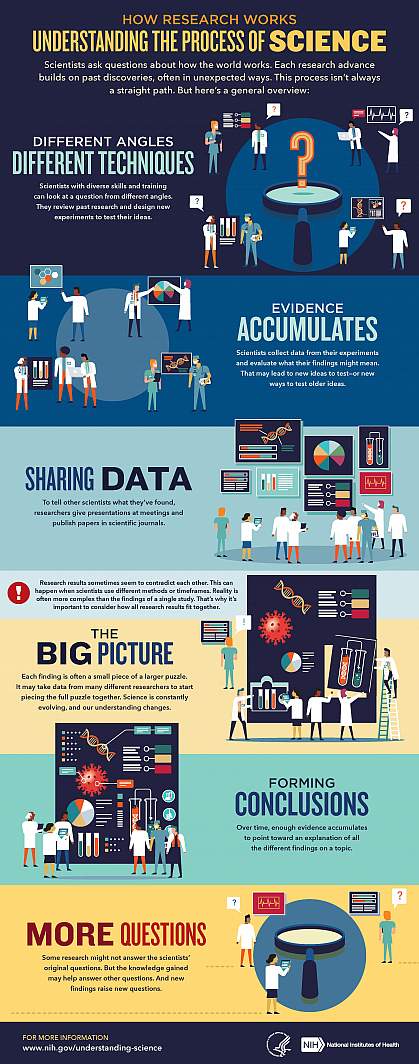
We’ve heard “follow the science” a lot during the pandemic. But it seems science has taken us on a long and winding road filled with twists and turns, even changing directions at times. That’s led some people to feel they can’t trust science. But when what we know changes, it often means science is working.

Explaining the scientific process may be one way that science communicators can help maintain public trust in science. Placing research in the bigger context of its field and where it fits into the scientific process can help people better understand and interpret new findings as they emerge. A single study usually uncovers only a piece of a larger puzzle.
Questions about how the world works are often investigated on many different levels. For example, scientists can look at the different atoms in a molecule, cells in a tissue, or how different tissues or systems affect each other. Researchers often must choose one or a finite number of ways to investigate a question. It can take many different studies using different approaches to start piecing the whole picture together.
Sometimes it might seem like research results contradict each other. But often, studies are just looking at different aspects of the same problem. Researchers can also investigate a question using different techniques or timeframes. That may lead them to arrive at different conclusions from the same data.
Using the data available at the time of their study, scientists develop different explanations, or models. New information may mean that a novel model needs to be developed to account for it. The models that prevail are those that can withstand the test of time and incorporate new information. Science is a constantly evolving and self-correcting process.
Scientists gain more confidence about a model through the scientific process. They replicate each other’s work. They present at conferences. And papers undergo peer review, in which experts in the field review the work before it can be published in scientific journals. This helps ensure that the study is up to current scientific standards and maintains a level of integrity. Peer reviewers may find problems with the experiments or think different experiments are needed to justify the conclusions. They might even offer new ways to interpret the data.
It’s important for science communicators to consider which stage a study is at in the scientific process when deciding whether to cover it. Some studies are posted on preprint servers for other scientists to start weighing in on and haven’t yet been fully vetted. Results that haven't yet been subjected to scientific scrutiny should be reported on with care and context to avoid confusion or frustration from readers.
We’ve developed a one-page guide, "How Research Works: Understanding the Process of Science" to help communicators put the process of science into perspective. We hope it can serve as a useful resource to help explain why science changes—and why it’s important to expect that change. Please take a look and share your thoughts with us by sending an email to [email protected].
Below are some additional resources:
- Discoveries in Basic Science: A Perfectly Imperfect Process
- When Clinical Research Is in the News
- What is Basic Science and Why is it Important?
- What is a Research Organism?
- What Are Clinical Trials and Studies?
- Basic Research – Digital Media Kit
- Decoding Science: How Does Science Know What It Knows? (NAS)
- Can Science Help People Make Decisions ? (NAS)
Connect with Us
- More Social Media from NIH
15 Steps to Good Research
- Define and articulate a research question (formulate a research hypothesis). How to Write a Thesis Statement (Indiana University)
- Identify possible sources of information in many types and formats. Georgetown University Library's Research & Course Guides
- Judge the scope of the project.
- Reevaluate the research question based on the nature and extent of information available and the parameters of the research project.
- Select the most appropriate investigative methods (surveys, interviews, experiments) and research tools (periodical indexes, databases, websites).
- Plan the research project. Writing Anxiety (UNC-Chapel Hill) Strategies for Academic Writing (SUNY Empire State College)
- Retrieve information using a variety of methods (draw on a repertoire of skills).
- Refine the search strategy as necessary.
- Write and organize useful notes and keep track of sources. Taking Notes from Research Reading (University of Toronto) Use a citation manager: Zotero or Refworks
- Evaluate sources using appropriate criteria. Evaluating Internet Sources
- Synthesize, analyze and integrate information sources and prior knowledge. Georgetown University Writing Center
- Revise hypothesis as necessary.
- Use information effectively for a specific purpose.
- Understand such issues as plagiarism, ownership of information (implications of copyright to some extent), and costs of information. Georgetown University Honor Council Copyright Basics (Purdue University) How to Recognize Plagiarism: Tutorials and Tests from Indiana University
- Cite properly and give credit for sources of ideas. MLA Bibliographic Form (7th edition, 2009) MLA Bibliographic Form (8th edition, 2016) Turabian Bibliographic Form: Footnote/Endnote Turabian Bibliographic Form: Parenthetical Reference Use a citation manager: Zotero or Refworks
Adapted from the Association of Colleges and Research Libraries "Objectives for Information Literacy Instruction" , which are more complete and include outcomes. See also the broader "Information Literacy Competency Standards for Higher Education."

IMAGES
VIDEO
COMMENTS
This article takes you through the first steps of the research process, helping you narrow down your ideas and build up a strong foundation for your research project.
A researcher is trained to conduct systematic and scientific investigations in a particular field of study. Researchers use a variety of techniques to collect and analyze data to answer research questions or test hypotheses.
Research is defined as a meticulous and systematic inquiry process designed to explore and unravel specific subjects or issues with precision. This methodical approach encompasses the thorough collection, rigorous analysis, and insightful interpretation of information, aiming to delve deep into the nuances of a chosen field of study.
Any time you use sources to investigate claims or reach new conclusions, you are performing research. Research happens in virtually all fields, so it’s vitally important to know how to conduct research and navigate through source material regardless of your professional or academic role.
Research is the deliberate, purposeful, and systematic gathering of data, information, facts, and/or opinions for the advancement of personal, societal, or overall human knowledge. Based on this definition, we all do research all the time. Most of this research is casual research.
The research design is a strategy for answering your research questions. It determines how you will collect and analyze your data.
A research proposal aims to show why your project is worthwhile. It should explain the context, objectives, and methods of your research.
According to the American sociologist Earl Robert Babbie, “research is a systematic inquiry to describe, explain, predict, and control the observed phenomenon. It involves inductive and deductive methods.” Inductive methods analyze an observed event, while deductive methods verify the observed event.
We’ve developed a one-page guide, "How Research Works: Understanding the Process of Science" to help communicators put the process of science into perspective. We hope it can serve as a useful resource to help explain why science changes—and why it’s important to expect that change.
Evaluate sources using appropriate criteria. Evaluating Internet Sources. Synthesize, analyze and integrate information sources and prior knowledge. Georgetown University Writing Center. Revise hypothesis as necessary. Use information effectively for a specific purpose.